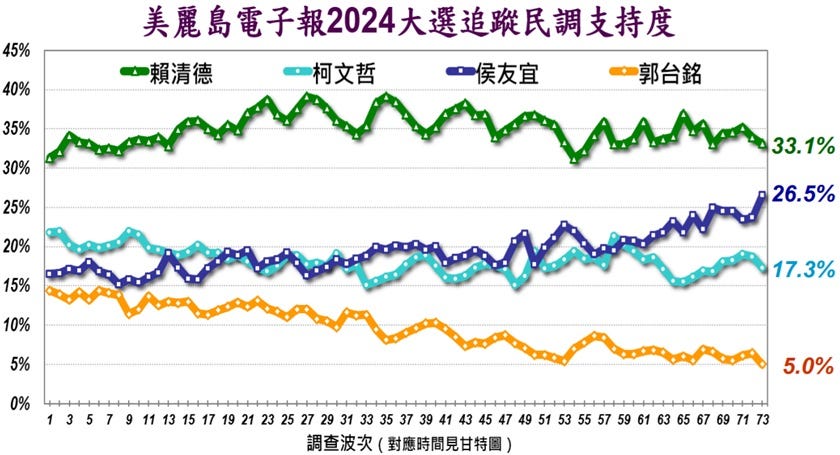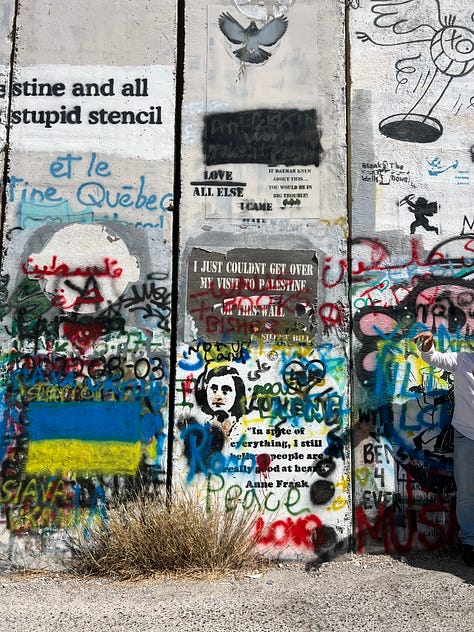The Geopolitical Soft Landing
Prospects for a durable and peaceful co-existence
Amid all the crises in the world, a potential “soft landing” has begun to emerge. It is certainly too early to hope for such an outcome, as wars rage in the Middle East and Ukraine. Furthermore, such a soft landing would require a lot of sacrifice, and some may wonder whether the outcome is even desirable. Many whom I respect, like the Russian dissident Garry Kasparov, may well argue that we need to instead take a more combative stance against Russia and China. I’m receptive to that perspective, as he is correct that any peace with, eg, Vladimir Putin is short-lived as he uses it to plan his next invasion. Similarly, “resets” of the US-China relationship have proven evanescent, a memorable example being Xi Jinping’s pledge to Barack Obama not militarize occupied islands in the South China Sea literally months before military fortifications appeared in satellite images.

But putting aside all the reasons for cynicism (and my shared long shot desire for things like a total victory for Ukraine), what could a geopolitical soft landing look like?
Beginning with Ukraine, a soft landing would require a few crucial elements. Ukraine would have to make painful concessions of territory, and in exchange be given true security reassurances by ascending into NATO. While short of the total victory for Ukraine that I too would celebrate, Ukrainians still have much to be proud of: an assertion of their national identity, a valiant defense of their territory against one of the most fearsome militaries in the world (at least at the time of invasion), aligning much of the Western and free world behind their cause, delivering a massive rebuke for Russia (I’d argue, a true loss for Russia militarily and economically) despite some territorial gains, and perhaps achieving long-sought EU and NATO membership.
What I am trying to convey is that Ukraine should be able to feel proud of their performance in the war and secure with a NATO ascension despite a neighboring aggressor. If this can also be acceptable to Ukrainians, then a soft landing is possible.
US-China relations have also enjoyed a momentary respite on the heels of APEC in San Francisco, where Xi and Biden met and China’s state media noticeably warmed to the United States. Even Biden’s offhand remark that Xi is as “a dictator” has been downplayed or ignored by China state media, conveying a desire to thaw relations. Military-to-military communications have also been restored, after China had severed them to retaliate against Nancy Pelosi’s visit to Taiwan. Xi even has signaled that China will send new pandas to the United States, remarking that the pandas serve as “envoys of friendship between the Chinese and American peoples.” As China’s economy contracts and Western businesses flee crackdowns, there seems to be ample enthusiasm for a normalized relationship with the United States.

A soft landing in US-China relations would require that Beijing accept Taiwan’s continued de facto independence (even if it prefers to label it as a “renegade province”). An invasion of Taiwan, of course, would end any goodwill and could spark a third World War, not to mention an economic catastrophe given the global dependence on Taiwan for microchips and the major shipping corridor in the Taiwan Strait. Taiwan’s domestic politics also is presenting some opportunities for a soft landing with China. Taiwan’s current ruling party, the DPP, is often thought of as more independence-minded in contrast to the more China-friendly KMT. Taiwan has an election in January, and the DPP has enjoyed a healthy lead due to an opposition split between the KMT and the new TPP, but these two opposition parties are in the midst of talks to combine their candidacy in a way that would much better position themselves to defeat the incumbent DPP, thus reassuring China of a more friendly government in Taiwan.

Yet just as Ukraine needs NATO ascension to make a soft landing durable, Taiwan needs continued US military support in the form of arms sales, grants, and assurances of US direct intervention (with ambiguity calibrated to the China’s threat of invasion). A challenge is that such support would be in defiance of Xi’s request to Biden at the APEC summit that the US “stop arming Taiwan.” A soft landing would require Taiwan’s acceptance to remain an under-recognized country, China’s acceptance of Taiwan’s de facto independence, and the United States’ acceptance of the responsibility to aid Taiwan’s defense.
The final component is the war in Gaza. As I’ve described previously, the terrorism of Hamas on October 7th was horrifying and Gaza is now being invaded by Israel in order to destroy the terror group that has governed the territory. Hamas’ terror is inexcusable, yet to understand the full context of the Israel-Palestine conflict requires a lot of nuance and complexity around issues such as Prime Minister Netanyahu’s own efforts to empower Hamas in Gaza in order to create divisions between that territory and the Fatah-ruled West Bank, inexcusable settler incursions into the West Bank, and the Netanyahu administration’s legitimization of religious extremists and settlers into his government. And beyond the Levant, you must consider Iran-backed militias in Syria and Lebanon that are constant antagonists to peace in Israel.



As the war wages on, it is premature to presume what a soft landing would look like here, especially as Israel has essentially been at a state of on-and-off war since its founding in 1948. Yet despite the terrible events of October 7th and the tumult of the war in Gaza, these same events create a window (however narrow) for a peaceful resolution. The most feasible peaceful resolution remains the two state solution, where Palestinians in Gaza and the West Bank achieve formal statehood beside the neighboring state of Israel, with some sort of shared jurisdiction of Jerusalem. This war has plummeted the support of Prime Minister Netanyahu, making his removal (and thus a major obstacle to a two state solution) suddenly feasible. Likewise, the removal of the Hamas terror regime in Gaza can help bring about a two state solution, especially if it allows unified governance with the West Bank and an international effort rebuilding Gaza. The United States should use leverage that it has with Israel to push it to accept the necessity of Palestinian statehood. Despite the war raging on, the Biden administration has already indicated that this is the necessary outcome: a “real” Palestinian state must come after the war.
If it were up to me, Ukraine would recover all of its territory, Taiwan would sit on the UN Security Council, and Israel and Palestine would have a relationship similar to that of the USA and Canada. However I still find this soft landing an acceptable outcome that avoids a world war while returning the world to a mostly peaceful co-existence. Despite the chaos of the current moment, it presents some opportunities to course correct and achieve durable peace.


nice piece